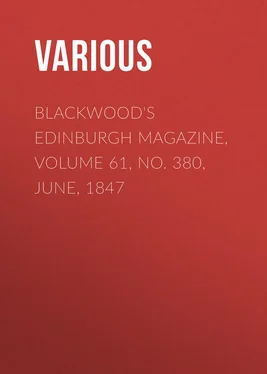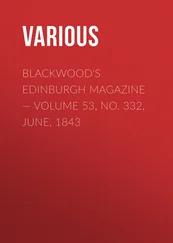Various - Blackwood's Edinburgh Magazine, Volume 61, No. 380, June, 1847
Здесь есть возможность читать онлайн «Various - Blackwood's Edinburgh Magazine, Volume 61, No. 380, June, 1847» — ознакомительный отрывок электронной книги совершенно бесплатно, а после прочтения отрывка купить полную версию. В некоторых случаях можно слушать аудио, скачать через торрент в формате fb2 и присутствует краткое содержание. Издательство: Иностранный паблик, Жанр: Путешествия и география, periodic, foreign_edu, на английском языке. Описание произведения, (предисловие) а так же отзывы посетителей доступны на портале библиотеки ЛибКат.
- Название:Blackwood's Edinburgh Magazine, Volume 61, No. 380, June, 1847
- Автор:
- Издательство:Иностранный паблик
- Жанр:
- Год:неизвестен
- ISBN:нет данных
- Рейтинг книги:5 / 5. Голосов: 1
-
Избранное:Добавить в избранное
- Отзывы:
-
Ваша оценка:
- 100
- 1
- 2
- 3
- 4
- 5
Blackwood's Edinburgh Magazine, Volume 61, No. 380, June, 1847: краткое содержание, описание и аннотация
Предлагаем к чтению аннотацию, описание, краткое содержание или предисловие (зависит от того, что написал сам автор книги «Blackwood's Edinburgh Magazine, Volume 61, No. 380, June, 1847»). Если вы не нашли необходимую информацию о книге — напишите в комментариях, мы постараемся отыскать её.
Blackwood's Edinburgh Magazine, Volume 61, No. 380, June, 1847 — читать онлайн ознакомительный отрывок
Ниже представлен текст книги, разбитый по страницам. Система сохранения места последней прочитанной страницы, позволяет с удобством читать онлайн бесплатно книгу «Blackwood's Edinburgh Magazine, Volume 61, No. 380, June, 1847», без необходимости каждый раз заново искать на чём Вы остановились. Поставьте закладку, и сможете в любой момент перейти на страницу, на которой закончили чтение.
Интервал:
Закладка:
The road now passed through Vermont, the state of green mountains. The country appeared striking; and Montpelier, where they breakfasted, seems to be a very pretty place, looking more the residence of hereditary ease and luxury, than the capital of a republic of thrifty graziers. It is, in fact, an assemblage of villas; the wide streets run between rows of trees, and the houses, each in its own little garden, are shaded by verandas.
In that very pleasant little book, the "Miseries of Human Life," one of those small calamities is, the being called at the wrong hour to go off in the wrong coach from a Yorkshire inn. Time and the railroad have changed all this in England, but in America we have the primitive misery well described.
The author, after forty-two hours of hard jolting, goes to bed at one o'clock to obtain a little repose, leaving orders to be called at five in the morning. He is wrapt in the profoundest of all possible slumbers, when a peal of blows is heard at his door. "In spite, however, of laziness, and a cold morning to boot," he says, "I had completed the operations of washing and dressing by candlelight, having even donned hat and gloves, to join my companions, when the waiter entered my room with a grin. 'I guess,' said the rascal, 'I have put my foot in it. Are you the man that wanted to be called at two?' 'No,' was my reply. 'Then,' said he, 'I calculate I have fixed the wrong man, so you had better go to bed again.' Having delivered himself of this friendly advice, he went to awaken my neighbour, who had all this time been quietly enjoying the sleep that properly belonged to me. Instead of following the fellow's recommendation, I sat up for the rest of the night." Whether the author possessed a watch we cannot tell, but if he was master of that useful and not very rare article, he might have saved himself his premature trouble, and escaped shaving at midnight.
On crossing into the Canadian territory, he encounters one of those evidences of popular liberty which belong to rather the American than the English side. In the village of St John's, some of the party went a-head to the principal inn, and as it was late at night, and their knocking produced no effect, they appealed to what they regarded as the most accessible of the landlord's susceptibilities, his pocket, by saying that they were fourteen, more coming, with a whole host of drivers. This appeal was the most unlucky possible, for the landlord had another sensibility, the fear of being tarred and feathered, if not hanged. On the door being opened at last, the landlord was not to be found; his brother wandered about, the very ghost of despair. The establishment was searched upside and downside, inside and outside, in vain; and they began to think themselves the cause of some domestic tragedy; but it must have been a late perpetration, for on looking into his bed, they found the lair warm.
However, after a short time, mine host returned with a face all smiles. The mystery was then explained. The election had taken place during the day, and the landlord, having taken the part of the candidate who eventually succeeded, was threatened with vengeance by the losing party. The arrival of the travellers convinced him that his hour was come, and he had jumped out of bed and hidden himself in some inscrutable corner. But a good supper reconciled every thing.
The author crossed the ice to Montreal, and had a showy view of the metropolis of the Canadas. A curious observation is suggested by Montreal, on the different characters of the English and French population. In the days of Wolf and Amherst, it was all French; but John Bull, with his spirit of activity and industry, has quietly become master of all the trading situations of the city, while the French have as quietly retreated, and spread themselves through the upper sections of it, to a great degree cut off from its commercial portions.
From Montreal the travel began. The heavy canoes were sent forward some days before, under the charge of some of the Company's officers, the light canoes waited for the author, with Colonel Oldfield, chief engineer in Canada, who was going up the country on a survey of the navigation, and the Earls of Mulgrave and Caledon, who were going to the Red River, buffalo-hunting.
All was now ready in form, and on the 4th of May the two canoes were floating on the Lactrine canal. The crews, thirteen to one vessel, and fourteen to the other, were partly Canadians, but principally Iroquois. Those voyageurs , as they are called, had each been supplied with a feather in his cap, in honour of the occasion, and evidently expected to produce a sensation on shore. But a north-wester blowing prevented the hoisting of their flags, which mulcted the pageant of much of its intended glory. These canoes are thirty-five feet in length, and five feet wide in the centre; drawing about eighteen inches water, and weighing between three and four hundred pounds; capitally fitted for a navigation among rocks, rapids, and portages; but they seem most uncomfortable in rough weather. The waves of the St Lawrence rolled like a sea, the gale was biting, and the snow drifted heavily in the faces of the party. In this luckless condition, we are not surprised at the intelligence, that at St Anne's Rapids, notwithstanding the authority of the poet, "they sang no evening hymn."
This style of travelling was not certainly much mingled with luxury. Next morning, after "toiling for six hours," they breakfasted, "with the wet ground for their table, and with rain in place of milk to cool their tea." On this day, while running close under the falls of the Rideau, they seem to have had a narrow escape from a finale to their voyage; their canoes being swept into the middle of the river, under an immense fall, fifty feet in height.
They now learned the art of bivouaching , and after a day of toiling through portages, reserving the severest of them, the Grand Calumet, for the renewed vigour of the morning, they made ready for the forest night. The description, brief as it is, is one among many which shows the artist eye.
"The tents were pitched in a small clump of pines, while round a blazing fire the passengers were collected, amid a medley of boxes, barrels, cloaks, and on the rock above the foaming rapids were lying the canoes; the men flitting about the fires as if they were enjoying a holiday, and watching a huge cauldron suspended above the fire. The whole with a background of dense woods and a lake."
Yet, startling as this "wooing of nature" in her rough moods may seem to the silk-and-velvet portion of the world, we doubt whether this wild life, with its desperate toil and its ground sleep, may not be the true charm of travel to saint, savage, or sage, when once fairly forced to the experiment. The blazing fire, the bed of leaves, the gay supper, made gayer still by incomparable appetite, and the sleep after all, in which the whole outward man remains imbedded, without the movement of a muscle and without a dream, until the morning awakes him up a new being, are fully worth all the inventions of art, to make us enjoy rest unearned by fatigue, and food without waiting for appetite. "The sleep of the weary man is sweet," said the ancient and wise king who slept among curtains of gold, and under roofs of cedar; the true way to taste that sleep is to spend a day, dragging canoes up Indian portages, and lie down with one's feet warmed by a pine blaze and one's back to the shelter of a forest.
But, as the time will assuredly come when this "life in the woods" will be no more, when huge inns will supersede the canopy of the skies, and down beds will make the memory of birch twigs and heather blossoms pass away, we give from authority the proceedings of an evening's rest, which the next generation will study with somewhat of the feeling of reading Tacitus De Moribus Germanorum.
Читать дальшеИнтервал:
Закладка:
Похожие книги на «Blackwood's Edinburgh Magazine, Volume 61, No. 380, June, 1847»
Представляем Вашему вниманию похожие книги на «Blackwood's Edinburgh Magazine, Volume 61, No. 380, June, 1847» списком для выбора. Мы отобрали схожую по названию и смыслу литературу в надежде предоставить читателям больше вариантов отыскать новые, интересные, ещё непрочитанные произведения.
Обсуждение, отзывы о книге «Blackwood's Edinburgh Magazine, Volume 61, No. 380, June, 1847» и просто собственные мнения читателей. Оставьте ваши комментарии, напишите, что Вы думаете о произведении, его смысле или главных героях. Укажите что конкретно понравилось, а что нет, и почему Вы так считаете.












